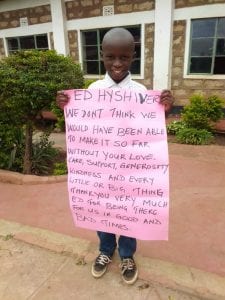
The Setauket-based Hope Children’s Fund is asking residents to financially support young orphan children in Meru, Kenya through school in the fund’s mentorship program.
According to Aida Mann, a board member of the fund, the program participates with 97 orphans, though they currently have only around 45 mentors. These mentors donate $1 a day for a total of $365 a year. The money truly goes to support all the kids in the program, whether it’s to pay for their school tuition, books, shoes or uniforms.
“If we had 96 mentors, and if they pay $365, a child, another child will write to them through email and they’ll send postcards,” Mann said. “We’re trying to set it up so that they know each other, they introduce each other.”
The orphanage itself is a unique one, established in an old church that includes a dining area and separate dormitories for boys and girls.
The group has also started a program June 15 whereby people can donate $210, enough to help feed the entire orphanage for a week. The group has sponsors only up until Aug. 20, and every week the nonprofit shows pictures on its Facebook of the children thanking their supporters.
Mann and her husband Kevin, of Middle Island, who is also a member of the Rocky Point Rotary Club, regularly take trips to Meru to visit the orphanage. Mann said they have sponsored a child since she was 9 years old. That child just celebrated her 25th birthday.
“Hopefully what we try to do is get people to maintain that child,” she said. “To have a mentor is so important to a child. These are orphans who don’t have anyone. We have a house mother and a house father, but you can’t give personal attention or affection, let’s say, to each child when you have that many.”
A mentor’s responsibility, she said, is to get in contact and then share that communication with them. Being orphans, many have no regular access to things like clothes. Schools in that part of Kenya also require a tuition to attend.
“It’s about sustaining them in everything — what we try to do is make sure first and foremost is education. Sometimes they just want someone to talk to, someone who cares whether they wake up in the morning or not.”






